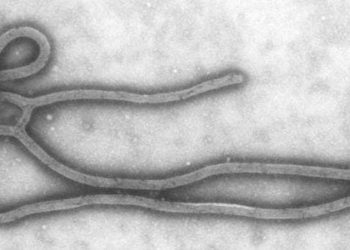rVSV-ZEBOV Ebola vaccine highly effective and safe in trials conducted in Guinea
1. Interim results from an open-label cluster-randomized trial of the novel rVSV-ZEBOV Ebola virus vaccine showed 100% vaccine efficacy in preventing Ebola virus in close contacts of infected individuals. There were no cases of Ebola virus disease at 10 days after randomization in the immediate vaccination group, while there were 16 cases in the delayed vaccination group.
2. No new cases of Ebola virus were detected within 6 days of vaccination in both the immediate and delayed vaccination groups.
Evidence Rating Level: 1 (Excellent)
Study Rundown: There are currently no licensed vaccines available against Ebola virus, although many promising candidate vaccines are being studied in primates and phase 1 human trials. This study reported the interim results of a recombinant, replication-competent vesicular stomatitis virus-based candidate vaccine expressing the glycoprotein of a Zaire Ebolavirus (rVSV-ZEBOV). rVSV-ZEBOV has been shown to cause a rapid immune response in previous studies, and a phase 3 trial is currently being conducted in Guinea to assess its efficacy in preventing Ebola virus disease, using a ring vaccination method, in which clusters of individuals at high risk of infection are vaccinated based on their connection to an index case. After confirmation of a new infection, clusters of contacts and the contacts of contacts were randomly assigned to immediate vaccination or delayed vaccination (after 21 days) with rVSV-ZEBOV.
Interim results showed no cases of Ebola virus at 10 days after randomization in the immediate vaccination group, but 16 cases from seven clusters in the delayed vaccination group, indicating 100% vaccine efficacy. Additionally, there were no new Ebola virus cases within 6 days of vaccination in the immediate or delayed vaccination groups. 43 serious adverse events occurred, with only an episode of febrile illness determined to be caused by vaccination. This study was limited by being an open-label study, in which it was not possible to mask participants and field teams, however, Ebola response teams and laboratory workers were blinded to the randomization of immediate or delayed vaccination. As of publication, this trial was advised to discontinue randomization and continue with immediate vaccination of new clusters of participants.
Click to read the study in The Lancet
Click to read an accompanying editorial in The Lancet
Relevant Reading: Phase 1 Trials of rVSV Ebola Vaccine in Africa and Europe — Preliminary Report
In-Depth [randomized controlled trial]: This open-label cluster-randomized trial was conducted in Guinea with a pilot phase beginning on March 23 and interim results reported up to July 20, 2015. After new Ebola virus cases were confirmed by laboratory testing, clusters of all contacts and the contacts of contacts were randomly assigned 1:1 to receive either immediate vaccination or delayed vaccination (21 days later) with rVSV-ZEBOV, administered intramuscularly in the deltoid muscle. Eligible participants included adults aged 18 and over who were not pregnant or breastfeeding. The primary outcome was the laboratory confirmation of Ebola virus disease with symptom onset at least 10 days after randomization, and the primary analysis compared the incidence of Ebola virus in immediate vaccination clusters to delayed vaccination clusters.
90 clusters containing 7,651 individuals were included in the analysis, with 48 clusters (4,123 participants) randomized to immediate vaccination, and 42 clusters (3.528 participants) randomized to delayed vaccination. In the immediate vaccination group, 3,035 (74%) participants were eligible for vaccination and 2,014 (49%) were vaccinated, while 2,380 (67%) participants were eligible for vaccination in the delayed group, and 1,498 (42%) were vaccinated. There were no cases of Ebola virus at 10 days after randomization in the immediate vaccination group, while there were 16 cases from seven clusters in the delayed vaccination group, resulting in 100% vaccine efficacy (95% Confidence Interval [CI] 74.7-100; p=0.0036). There were also no new cases of Ebola virus diagnosed within 6 days of vaccination in both groups. There were 43 serious adverse events reported, with only one event, an episode of febrile illness which resolved without complications, that was determined to be caused by vaccination.
Image: PD
©2015 2 Minute Medicine, Inc. All rights reserved. No works may be reproduced without expressed written consent from 2 Minute Medicine, Inc. Inquire about licensing here. No article should be construed as medical advice and is not intended as such by the authors or by 2 Minute Medicine, Inc.






